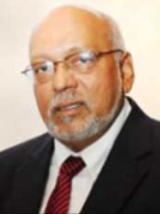PORT OF SPAIN, Trinidad (GINA) — While the global environment may have changed from when the Treaty of Chaguaramas establishing the Caribbean Community (CARICOM) was signed on July 4, 1973, CARICOM integration is needed more than ever, Guyana’s President Donald Ramotar said in Trinidad.

CARICOM leaders have gathered in that country for the 34th regular meeting of the conference of heads of government.
“Today even though much has changed, and we have made some progress, the need for integration is probably greater now than it was when this treaty was signed 40 years ago.
The financial and economic crises that began in Europe and North America have impacted heavily on our region, and clearly the need for us to have greater integration has become more urgent.
This occasion, while it calls for celebration, is also one for reflection, self evaluation on whether we have been effective enough in our integrative efforts.
As leaders we must ask ourselves whether the peoples of the region have benefitted fully from this process.
The implementation deficit is widely spoken about. We must ask ourselves if there is a commitment deficit.
Let us recommit to reducing, if not eradicating the implementation deficit which CARICOM now faces,” Ramotar stated.
Noting that it was opportune for the Community to recommit to an integrative process that is always adaptable to the changing circumstances he said, “Optimal utilisation of our productive capacity will remain elusive in the absence of strong and meaningful integration. We must also never forget that our people must see and feel the benefits of integration.”
Recalling the words of the late Guyanese President Dr Cheddi Jagan, who at a special session of CARICOM heads of government in October 1992, said, “We have to work as a collective and consult our respective constituencies so that we march, not ahead or behind but together with our people”, Ramotar said there is no doubt that the region has made progress as several institutions have been established, and decisions taken.
“It is time for us to move the process forward with more vigour and more purpose.
We have several studies and decisions for example relating to transportation, the regional financial architecture, the Jagdeo Initiative for Agriculture; and the free movement of people and hassle free travel – which is vital and very important in helping us to strengthen our resolve.
We know that these measures will redound to the interest of the region and positively impact on the lives of our people.
The implementation deficit needs to be resolved lest we find ourselves guilty of a commitment deficit,” he stated.
He expressed the hope that reform process currently engaging the region’s attention will result in a mechanism that is more proactive.
“Let me end by paying tribute to the four founding leaders who displayed courage and foresight, qualities which this generation must adopt in realising the dream of a united, peaceful and prosperous Caribbean,” Ramotar concluded.
Forty years subsequent to the leaders of Barbados, Guyana, Trinidad and Tobago and Jamaica affixing their signatures to the Treaty of Chaguaramas, the present generation of Caribbean leaders took more than two hours to re-enact the signing, symbolically in Chaguaramas, Trinidad and Tobago.
It was at Chaguaramas on the north western peninsula of Trinidad that Errol Barrow (Barbados), Norman Manley (Jamaica), Dr Eric Williams (Trinidad and Tobago) and Forbes Burnham (Guyana) met to discuss ways of determining closer regional cooperation. Four decades on, the present batch of regional leaders are of the view that CARICOM has a major role to play in the socio-economic development of the Caribbean region.
The regional leaders also counselled that it was crucial that the regional grouping surmount its implementation deficit and allow Caribbean people, particularly the younger generation to see and feel the benefits of integration.
At this heads of government conference, which concludes on July 6, improving regional transportation will be addressed, as the free movement of nationals across the 15-member grouping is being encouraged.
